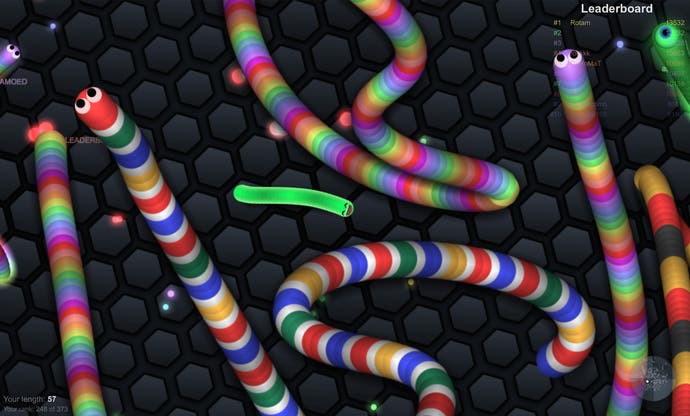Snake's alive! The expanding cult of Slither.io
Win screen vipers.
With apologies to Kojima, the original Snake was pretty solid. A killer app before smartphones were even a thing, the game transformed blocky Nokia handsets into persuasive handheld gaming devices. Now there's a free globalised upgrade for desktop, iOS and Android that smooths off some of Snake's traditional right-angle corners and sticks a pair of Cookie Monster googly eyes on it. In Slither.io, you are still tasked with chugging around the screen eating blobs to grow your snake from slim adder to bonzer anaconda. It's just that there are four or five hundred other players trying to do the same thing.
It's Snake reimagined on a massive, multiplayer scale, a squidgier, more populous cousin to Tron's vivid lightcycle deathmatches. Danger is all around as you curve round the arena. Your expanding body is both your weapon and your shield, allowing you to loiter in your own coils if things get crowded. If your head comes into contact with another snake, you perish, leaving behind a ghostly imprint of nourishing blobs for your foes to feast on. It's recycling in action: to the victor, the coils!
Since launching in March, Slither.io has grown to be one of the casual gaming success stories of 2016. Your work colleagues are playing it. Your nephew is playing it. Judging by social media updates, it can sometimes feel like everybody is playing it. Partly, that's because the barrier to entry is extraordinarily low. Pick a nickname, click play and you're off, using mouse or arrow keys to plot a course round the play area as your snake trundles endlessly forward.

Once you've got some food in your belly, a mouse click or keyboard press activates a turbo boost, albeit one that drains your score (and hence your size) while engaged. You soon discover that ramming isn't a particularly good tactic, since your head is so vulnerable. But a well-timed surge can hem in an opponent, get you out of a tight spot or gift you first dibs on a haul of blobs. It might be just a little too fast to feel controllable but that's all part of the fun.
Some casual games sweep you off your feet with their artful design and UI. Some are super-slick cartoons with irresistible jaunty soundtracks. Others demand your focus through chilly ultra-minimalism. Slither.io exists in some other, slightly more handmade space. There are those googly eyes, and a colour palette so wide-ranging it borders on the random. Among the selectable skins, there are earth tones, multiple shades of purple, a selection of national flag themes, snakes with deely-boppers and even a Hulk-green monocular nightmare.
This tropical-ready cast suggests a teeming jungle would be an appropriate setting to do battle. Instead, the world of Slither.io resembles an industrial test facility, a circular arena constructed from anonymous grey hexagons perhaps left over from the last series of Blockbusters. There is a (pretty useless) map, a leaderboard keeping track of the ten biggest snakes currently in play and a tiny readout of your own score. Pointedly, there is no soundtrack, no goofy gobble-gobble SFX. (This, even, could be the real masterstroke, allowing Slither.io to be mutely and discreetly played in the bottom right-hand corner of a workstation screen. It requires attention but does not monopolise it, the perfect game for catching up on podcasts.)
So there's colour, chaos and the inescapable feeling that you can do better next time. It's horribly, diabolically, engrossingly addictive. When you die, the screen fades out slowly enough that you can usually see the yellow-bellied snake who killed you celebrating by hoovering up your life essence. Your first thought: revenge! Restarting is instantaneous, and the game experience effortlessly expands to fit whatever time you have to spare before subtly impinging on all that time you don't. Finally make it into the top ten? Strike out for a quiet corner of the map to enjoy the fleeting fame of being on the leaderboard. Live out that Moby-Dick fantasy. Create your own story of a legendary, elusive behemoth: "Call me hiss male..."

The aquatic feel is real. Blobs waiting to be hoovered up all bob slightly, as if subject to invisible eddies and currents. The lumpy turning circle of your snake suggests pulling against some kind of resistance. And like a shark, you can never stop, your avatar swimming on regardless. It feels like an actual ecosystem, more primal than even the most recent Far Cry. The encircled arena was presumably inspired by the spherical nature of most of the game's assets. But it also puts you in mind of a petri dish. Here you are, squinting through a microscope at life reduced to its simplest level. It's survival of the fittest etched out in Crayola colours.
That's why I'd like David Attenborough, still clearly open to new experiences in his 90th year, to have a shot of Slither.io - with all those decades of observing animals in their natural habitat, I think he'd recognise some of the patterns of behaviour on display. The little tiddlers gliding in the wake of one big beast hoping for scraps. The unhurried social waggle dance that becomes a frenzy when a lumbering giant expires, leaving all their mortal blobs up for grabs. The technique of "coiling", lazily circling an enemy and joining up with your own tail, hopefully before they realise they have been ensnared. In fact, never mind Sir David playing Slither.io - I want him to narrate it, illuminating what's happening and maybe soothingly instructing me where I'm going wrong.
What next for Slither.io? Striving to get bigger seems to be encoded into its DNA. On the desktop version, there's now the occasional YouTube-powered ad interstitial between restarts, a step toward monetising all those eyeballs. A recent update to the iOS and Android versions apparently added some extra, and apparently rather divisive, control schemes. Lots of players have complained about periodic lag issues. Expanding the range of (purely cosmetic) avatars would be welcome - what snake doesn't want to shed its skin occasionally? - but in an ideal world, everything else would be left alone. Within its own eccentric parameters, Slither.io is pretty much perfect.

